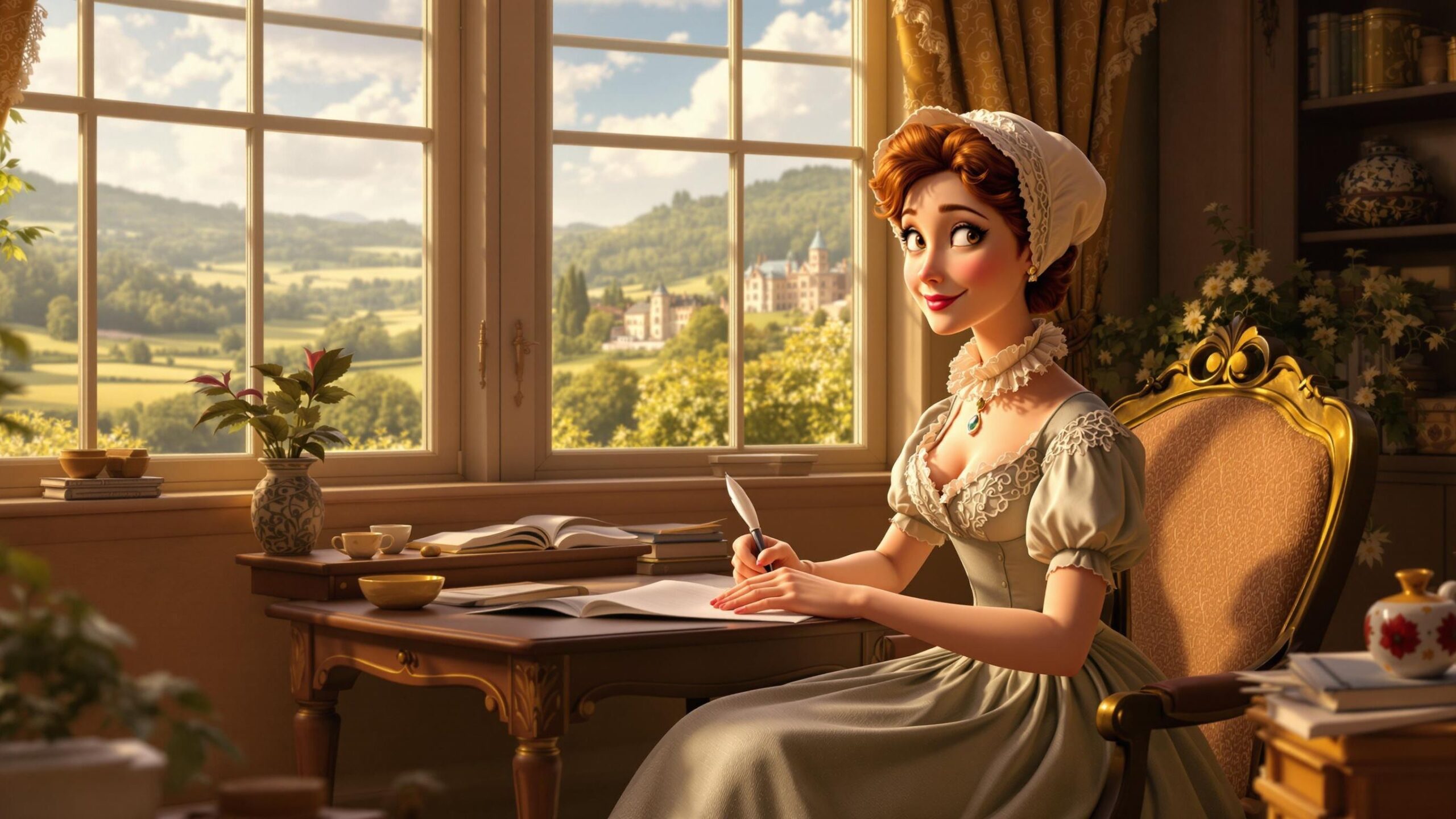Jane Austen didn’t need grand adventures or sweeping war scenes to make her mark. Armed with nothing more than a pen, a sharp mind, and a keen eye for human behavior, she turned the domestic lives of 19th-century English women into some of the most beloved and enduring literature of all time. Born in 1775, Austen lived through the Napoleonic Wars, major cultural shifts, and family financial ups and downs, yet chose to focus her novels on the drawing rooms, ballrooms, and whispered conversations of country society. It was a subtle, quiet rebellion, one where wit became a sword and romance a lens through which society could be examined. In Austen’s world, marriage isn’t just a happy ending—it’s a complex economic decision, a measure of social standing, and often, a woman’s only real option for security. Yet her characters refuse to be passive pawns. Elizabeth Bennet, Emma Woodhouse, Elinor Dashwood—these women think, feel, and challenge the world around them. Through their stories, Austen critiqued the rigid expectations of her time and carved out a space for women’s voices in literature. More than 200 years later, her novels still crackle with life, laughter, and relevance.
A Quiet Life, A Loud Voice
Jane Austen was born into a large, affectionate family in rural Hampshire, England. Her father was a clergyman, and her early life was filled with books, lively conversation, and spirited letter-writing among her siblings. Though she never married and led a life that might seem uneventful by modern standards, her interior world was rich with observation and imagination. Austen began writing young, penning satirical pieces and parodies of Gothic fiction before settling into the form that would define her legacy: the novel of manners.
Unlike the flamboyant Romantics or brooding Victorians who came after her, Austen wasn’t interested in literary grandeur. Her genius lay in her ability to see the extraordinary in the ordinary. She observed human nature with surgical precision, capturing every awkward silence, overbearing mother, hasty proposal, and hidden longing. Her social settings may have been limited—the countryside, Bath, or a drawing room—but within those confines, she found a universe of drama.
Austen never sought fame in her lifetime. Her novels were published anonymously, credited only to “A Lady.” Yet those stories quickly found an audience, and her wit, realism, and romance won hearts. Her voice, though quiet in public, was impossible to ignore on the page. In her six completed novels, she crafted a mirror that reflects the timeless dance between love, class, pride, and personal growth.
The Heroines Who Changed the Game
What makes a Jane Austen heroine so unforgettable? They are smart, independent, and deeply human. They aren’t perfect—far from it. They make mistakes, jump to conclusions, misread signals, and wrestle with their emotions. But they grow. And in a literary landscape once dominated by passive damsels or one-dimensional archetypes, Austen gave us layered, complex female leads who dared to think for themselves.
Elizabeth Bennet of Pride and Prejudice is arguably her most iconic character. With a sharp tongue and an even sharper sense of justice, Elizabeth refuses to marry for convenience and won’t let societal pressure cloud her judgment. Her journey from prideful assumptions to self-awareness mirrors the arc of the novel itself. Then there’s Emma Woodhouse of Emma, the charming but meddlesome matchmaker whose schemes cause both comic disaster and deep reflection. Emma is self-assured, occasionally insufferable, but ultimately kind-hearted—and capable of change.
In Sense and Sensibility, Austen gives us two heroines, Elinor and Marianne Dashwood, who represent logic and emotion, reason and passion. Their contrasting approaches to love offer a nuanced exploration of what it means to feel deeply while navigating a society that demands restraint. Austen’s heroines don’t rebel in obvious ways; instead, they assert their agency within a narrow framework, wielding wit and intelligence in a world that often underestimates them. In doing so, they paved the way for a new kind of female protagonist—one with both charm and spine.
Romance, but Make It Realistic
While Jane Austen is often thought of as the queen of romance, her love stories are anything but fairy tales. There are no love-at-first-sight swoons or grand declarations on mountaintops. Instead, her romances are slow burns, built on conversation, misunderstanding, and mutual respect. Austen understood that love isn’t just about passion—it’s about compatibility, timing, and personal growth.
Mr. Darcy doesn’t sweep Elizabeth Bennet off her feet. In fact, she detests him at first. It takes a humbling of both their egos and a recognition of each other’s character for their relationship to blossom. Captain Wentworth of Persuasion writes one of the most romantic letters in literary history, but only after years of regret and reflection. Even the less-discussed couples, like Fanny Price and Edmund Bertram in Mansfield Park, show that Austen favored substance over sparkle.
What makes these love stories endure is their grounding in reality. The characters must grow to earn their happy endings. And Austen never forgets the stakes involved—marriage wasn’t just about love. It was about survival. By giving her characters agency within this system, Austen critiques it even as she works within its confines. Her romances aren’t fantasies; they are negotiations of power, class, and emotion, delivered with sly humor and unflinching honesty.
Satire in Silk Gloves
Jane Austen had the rare ability to criticize without cruelty. Her social satire is biting but elegant, laced with irony and restraint. She pokes fun at pompous clergymen, social climbers, and marriage-obsessed mothers without ever turning her characters into caricatures. Mr. Collins of Pride and Prejudice is both ridiculous and painfully real. Lady Catherine de Bourgh is a tyrant in pearls. Mrs. Elton of Emma is hilariously self-important. Yet even at their worst, Austen treats her characters with a sort of wry affection.
Her humor is often subtle, nestled within polite dialogue or internal monologues. But it’s sharp as ever. She skewers the absurdities of social convention with a well-timed comment or an awkward encounter. In Northanger Abbey, she parodies Gothic novels while also acknowledging the pleasure they bring. In Persuasion, she gently mocks the naval elite and idle aristocracy.
Austen’s satire doesn’t just entertain—it exposes. It reveals the limitations placed on women, the performative nature of class, and the hypocrisy embedded in social norms. She used laughter as a tool for enlightenment, showing that even the most refined drawing room could be a stage for revolution.
Language, Wit, and the Power of the Pen
Part of what makes Jane Austen so endlessly quotable is her language. She didn’t write in the florid style popular in her day. Her prose is clean, concise, and brimming with wit. Every word is carefully chosen, every exchange a dance of meaning. Her dialogue sparkles, revealing character, conflict, and humor in a few crisp lines.
Austen’s writing feels modern because she trusted her readers. She didn’t over-explain. She didn’t write to impress. She wrote to illuminate. Her narrative voice is sly and knowing, often breaking the fourth wall to let the reader in on a joke or a hidden thought. This intimacy creates a bond between Austen and her audience—one that still holds strong centuries later.
Her novels reward close reading. The more you revisit them, the more you uncover—layers of irony, foreshadowing, and emotional nuance that reveal the depth of her craft. Austen didn’t shout. She whispered. And in doing so, she drew readers closer, making her observations all the more powerful.
A Legacy That Refuses to Fade
More than 200 years after her death, Jane Austen remains a cultural powerhouse. Her novels have never gone out of print. They’ve been adapted into dozens of films, TV shows, and stage productions—some faithful, some wildly creative. Clueless turned Emma into a 1990s teen comedy. Bridget Jones’s Diary reimagined Pride and Prejudice for the modern singleton. Her characters and quotes are stitched into tote bags, mugs, and memes. Austen is everywhere, and yet, she never feels overexposed.
Why? Because her insights into human behavior are timeless. Because we still laugh at awkward proposals and cringe at family drama. Because we still navigate love, ambition, and societal pressure with a mix of hope and sarcasm. Austen captured something universal in the particular. Her world of country balls and inheritance laws somehow speaks directly to our dating apps and dinner parties.
And her influence goes beyond pop culture. Writers from Virginia Woolf to Zadie Smith have cited Austen as a literary role model. Her command of character, dialogue, and structure is still taught in creative writing classes. Her ability to elevate everyday life into art changed what novels could be. She proved that a young woman with a pen and a point of view could change the world.
Conclusion: The Enduring Magic of Jane Austen
Jane Austen didn’t write epics or invent dragons. She didn’t chase fame or fortune. She wrote about sisters, neighbors, misunderstandings, and the slow, sweet burn of love. But in doing so, she redefined the novel. She gave voice to women’s thoughts, laid bare society’s hypocrisies, and showed that the most ordinary lives could be filled with extraordinary insight.
Her wit remains unmatched. Her characters feel like old friends. Her stories still pull us in, not because they transport us to a different world, but because they reflect our own. Whether you’re reading Pride and Prejudice for the first time or the fiftieth, there’s always something new to discover.
Jane Austen taught us that intelligence could be romantic, that sarcasm could be revolutionary, and that love—when grounded in truth—could be the greatest transformation of all. She was, and remains, a master of her craft. And her pen is still mightier than any sword.




